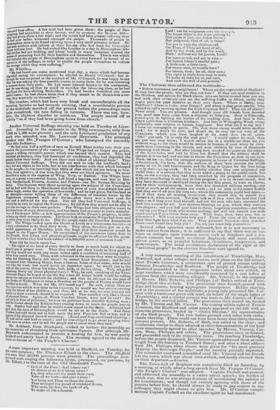Another Universal Suffrage meeting was held on Tuesday at Liver-
pool. According to the accounts in the Whig newspapers, only from 1,060 to 1,500 were present ; and the only Liverpool gentleman of any mark who attended was Mr. Lawrence Heyworth. The principal speaker was Mr. ;Feargus O'Connor ; who harangued the assembly after this fashion-
. He bad seen half a million of men on Kernall Moor taking into their pos. union the government of the cowntrg. The Whigs had no longer any power, wept a trifling executive power, which was beyond their control. They had violated all decency, they had destroyed all confidence' they had degraded the people below their level. And vet these men talked of physical force ! They wetted Universal Suffrage. They did not seek to take the landlord'. land ; they did not object to his title, but to his interference with that which belonged to the people—to his receiving four, fifths of that which did not belong to him. They were agitators, it was true, but they were not hired agitators. He never travelled a wile at the expense of Whig, Tory, or Radical. The Whigs, how- ever, as a great commercial house, had hired a bagman, and sent him to Hol- hod, Switzerland, Prussia, Austria, and France—one Dr. Syntax Bowfin by Mg, This bagman went about spouting upon the subject of the Corn.laws; and he had told them in Manchester that the price of corn was always low and labour high, under the operation of free-trade; and he had given Switzerland as so example—never telling them of the differenoe of taxation borne by the Englishman compared with the Swiss—that there was a free road for one and a tollostad for the other. But till they had Universal Suffrage, it would be in vain to repeal the Corn-laws; for till then they would not be able to put the savings in their own pockets. The Whigs had been obliged to resort to machinations of every description, and had lately had recourse to a new manufac
hue of Exchequer Bills—a new appropriation of the People's property, in order to keep up their corrupt system. Let them look at what the Whigs had done, and at what they were likely to do. Did the people make the Poor-law Amendment Bill? The Whigs looked upon the House of Lords as a wholesome barrier—as a body calculated to do their dirty work. They often, therefore, put on a de-
ceitful appearance of liberality, with the hope that their measures would be stopped in the Upper House. Ile complained of the enormous injury done to the People, that farms and pleasure-grounds might be afforded for the great. In three months they had been robbed of 6,200,000 acres of common land."
What did be insist upon ?—
" The right of the head of every family to farm so much kind, for which he should pay a proper rent. Then they could put their hands in their pockets, and they would not work any more unless upon a condition of receiving half of what they could earn. Then, with reference to the means they were to employ, what did Slashing Harry tell thorn? he meaut Lord Brougham ; and he haul christened him Slashing Harry, from a famous horse of that name, who would run like the wind, but could never be depended upon: he would run to the side of the course, throw his rider, bolt, kick, or do any thing. Well, what did Slashing Harry say about physical force? Why, lie said, speaking of the Three Glorious Days, he hoped to see the day when all kings' heads would be rolling about the streets as foutballe for children • and that an attempt on the part of the Duke of Wellington to force a Boman on the people of Fiance would have justified a revolt. What did Mr. O'Connell say ? Ile said, rather than see the injustice which was done to his country, he would see her streets running with the blood of her children ; and that, old as he was his arm Was not too feeble to draw a sword, should it be required. That sounded very like a threat of physical force. Again, at White Conduit House, what had he said? Do not tilt to him of petitions ; let Jilin see petitions from 500,000 fighting men ; sod he hinted about the Kildare boys coming down to teach the people how to vote. Stanley had said that he would resist repeal to the death. Attwood had said that the men of Birmingham would be led on to the death. And John Fielden had told them not to look upon the new Poor.law Bill as law, anti to oppose it by physical force if necessary. (Loud and long-continued cheering.) He had never said half so much ; and he was obliged to go about keeping these wild men in order, and to tell the people not to mind what they said."
Mr. Ackland, from Stockport, wished to lecture the assembly on the necessity of abstaining from spirituous liquors. But although Mr. Heyworth endeavoured to procure a hearing for him, he was partly laughed and partly hooted down. The meeting ngreed to the resolu- tions in favour of" the People's Charter."


























 Previous page
Previous page